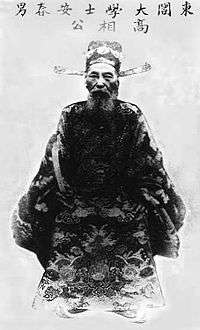Cao Xuân Dục
Cao Xuân Dục (Hán tự: 高春育; 1843–1923) was a scholar, historian-mandarin, and court adviser in the Nguyễn Dynasty, Vietnam.[1]

Cao Xuân Dục was born in Thịnh Mỹ, Diễn Châu, Nghệ An. In 1876, he entered Vietnamese Imperial examination and was awarded the degree of provincial graduate (舉人 - cử nhân), in same class with the famous anti-French patriot Phan Đình Phùng from Hà Tĩnh.
He served under Nguyễn Emperors Đồng Khánh and Thành Thái and held several important government posts including Governor-General of Hưng Yên (1889) and minister of education (1907). He was one of the four top advisers to the Emperor during the Vietnam-France conflict in early 20th century.
When Trương Như Cương, a pro-French collaborator, coerced his colleagues to sign a petition to Thành Thái to promote him to viceroy, Dục refused to sign - instead he wrote a quick poem on the petition.
| 天無二日 國無兩王 臣高春育 不可記 |
the sky cannot have two suns a nation cannot have two kings your servant Cao Xuân Dục cannot sign |
He was later vilified by Cương's group and demoted to a lowly local post in Hoàng Xá outside of Hanoi. A relief of Cao Xuân Dục was sculptured on a wall in a cave in this local region to commemorate his righteousness.[2]
Cao Xuân Dục retired in 1913 to concentrate on building his library, Long Cương Bảo Tàng Thư Viện (named after his pseudonym), collecting and maintaining Vietnamese literature.
A street in Ho Chi Minh city was named after Cao Xuân Dục[3]
Writings & co-writings
Cao Xuân Dục made significant contribution in maintaining Vietnamese culture and literature in 19th and 20th century.[4] He spent many years writing, collecting, copying, re-writing and preserving valuable books including:
- Annals of Đại Nam
- Quốc triều chính biên toát yếu
- Quốc triều khoa bảng lục - records of biographies of graduates of major Imperial exams.
Notes
- Bradley Camp Davis, States of banditry: The Nguyen government, bandit rule, and the culture of power in the post-Taiping China-Vietnam borderlands University of Washington 2008 - Page 104 "Cao Xuân Dục"
- Relief of Cao Xuân Dục in a cave in Hoàng Xá
- map of Cao Xuan Duc street Ho Chi Minh city
- Cao xuân Dục - Nhà văn hoá lớn cận đại - A/Prof. Chương Thâu (history)